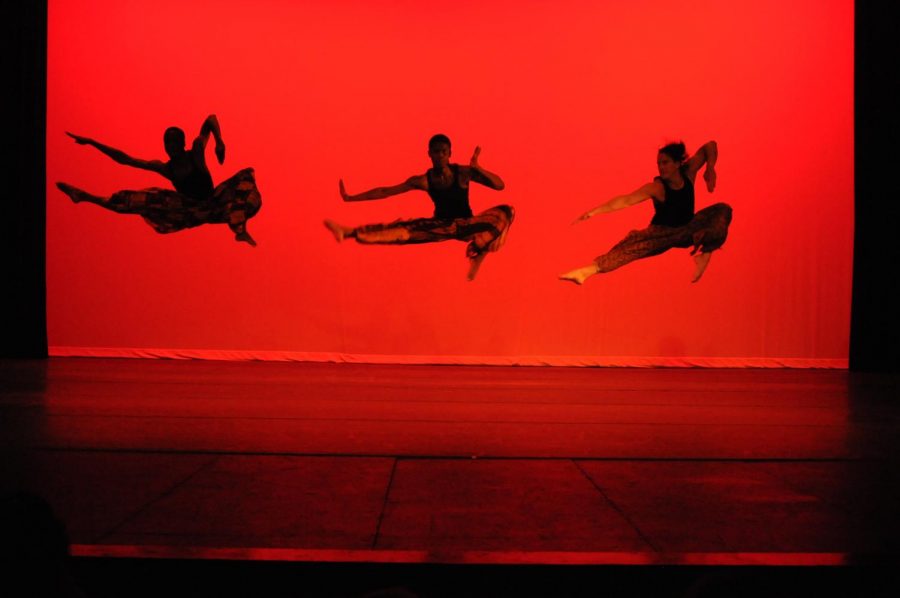Dance Company director modifies course to focus on pay gap
Lynda Fitzgerald, director of AACC’s Dance Company, says male dancers earn more because there are fewer of them, so they are harder to recruit. Featured dancers: Andre Hinds, Leo Williams, and Samuel Boquist.
December 14, 2020
The director of AACC’s Dance Company has modified a dance production course to focus, in part, on the gap in pay between male and female dancers.
Lynda Fitzgerald said male dancers earn more because there are fewer of them, so they are harder to recruit.
Fitzgerald, who learned of the issue while on a semester-long sabbatical last fall, said it “shocked” her. “I just didn’t expect that at all,” she said.
She said the way to change the situation is to teach students about the dance world’s realities.
“There’s no solution,” Fitzgerald said. “There’s no fast solution in place. I mean, it’s not going to change on a dime. I think the only way to really change is through education and over time. So, you know, I’m going to do what I can to make that happen.”
She added, “Educating our students is one step.”
Fitzgerald said the stereotypes surrounding male dancers make some men shy away from the profession.
“People have to get beyond the stereotype and understand that it’s a physically demanding activity,” Fitzgerald said. “It takes a lot of coordination and a lot of skill to do what dancers do.”
Shawn Cook, a fourth-year business administration and dance student, agreed.
“One of the reasons why I was reluctant to start dancing [was] because there is a stigma against wearing tights or tight-fitting clothing,” Cook shared.
“It’s just like a different ball game for men and women,” Emily Reyes, an AACC dance company alum, said. “Men, they take it pretty hard from the outside world, especially when they’re young.”
Fitzgerald said she recruits male dancers whenever she can.
“I always have my eyes open whenever I’m walking around,” she said. And if I see somebody dancing, I literally go right up to them and say, ‘Hey, you know, we need to talk,’ and I try to recruit.”
Some female dancers said they understand why men earn more.
Reyes said men get paid more because of supply and demand.
“It’s just, there’s more fish in the sea,” Reyes said. “If they need the same amount of male dancers and there’s fewer of them, they’re harder to find. To me, it’s just it’s just a supply and demand thing. It doesn’t bother me.”
“I wouldn’t think it’s wrong,” AACC dance company alum Gabby Pfeifer agreed. “I mean, when there’s a boy in an audition, you’re like, ‘Oh, he’s definitely going to get it because he’s a boy.’ You know, there is that thing.”
Cook said he has mixed feelings about male dancers earning more than women.
“In a sense, it’s kind of there … [because] there’s not that many men in the field,” said Cook. “But another part of me feels the pay should be equal.”
AACC dance company alum Rashad Ferguson said he strongly opposes the pay gap between male and female dancers.
“I certainly think that it makes sense to adjust the pay scale based on what you’re performing in,” he said. “You know, what role you’re playing in the show. But based on gender, certainly not.”
Dancers said gender inequity is not really a problem in the college’s Dance Company.
“Lynda really knows what she’s doing, and she definitely diversifies everything in that dance department,” Pfeifer said.
Reyes agreed. “Lynda has a way of bringing out strength and confidence in people through the dance company that I had never experienced before, so I had major growth as a dancer at AACC,“ she said.
Cook said Fitzgerald works with what she has.
“Even if a part, a certain section in her piece, may have been intended for a female dancer, she doesn’t close it off just for females,” Cook said. “If she wants you in that part, she will put you in that section.”
Fitzgerald said she values having both genders in the company.
“It just changes all the possibilities in what I can do,” she said. “So, it’s not that the women can’t do it too, but it’s just a matter of just having fun with a mixture of both men and women.”
Ferguson said it is important to encourage men to dance.
“It’s important to encourage guys to seek dance and to seek performance in general,” he said. “I think that there are stories that are necessary to be told through, you know, a male perspective. I think that we [all] have something to offer to the dance world.”












